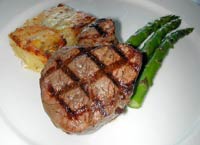USA's FDA says eating cloned meat and drinking cloned milk harmless
Milk and meat from some cloned animals are safe to eat, the US Food and Drug Administration said in a draft ruling that brings the controversial technology closer to American grocery carts.

If given final approval, the ruling would allow for the sale of food made from cloned cattle, pigs and goats, but not sheep, in the United States for the first time.
The agency said it would be unlikely to recommend special labels for food made from clones, which are genetic twins of donor animals, but would not decide on the labelling issue until it collects comments from the public over the next 90 days, reports The Age.
According to Bloomberg, the Food and Drug Administration proposed today that cloned animal products be cleared for sale based on a four-year review of data showing they are as safe to eat as natural-born goods. While the agency won't make a final decision before getting public feedback, officials said the review found no scientific basis for requiring cloned products to carry separate labels.
"We based our decision on looking at the health of the animal,'' said Stephen Sundlof, director of the FDA's Center for Veterinary Medicine, in a conference call today. "If this technology were going to introduce any hazards into the food supply, we ought to see some of those health effects occurring in the animal clones."
Sundlof said it is "conceivable'' that a final decision could be made before the end of 2007, making the U.S. the first country to approve the sale of cloned animal products. The FDA asked producers to continue adhering to a 5-year-old voluntary agreement to keep cloned animals and their offspring out of the food supply during the public comment period.
U.S. meat exports, already buffeted by concerns in some countries about mad-cow disease, also could hang in the balance. The FDA has consulted its major trading partners and agencies such as the U.S. Trade Representative, but it isn't clear if that will help the livestock industry -- if it chooses to use the cloning technique -- win over foreign consumers.
Even though cloned animals exist in countries such as Japan , New Zealand and Australia , none have gone so far in nudging them onto the market as the FDA. A French assessment of cloning reached the same conclusions, but that hasn't translated into public policy. European consumers, more than their U.S. counterparts, are skeptical about foods such as those that are genetically modified, informs Portsmouth Herald News.
Subscribe to Pravda.Ru Telegram channel, Facebook, RSS!





